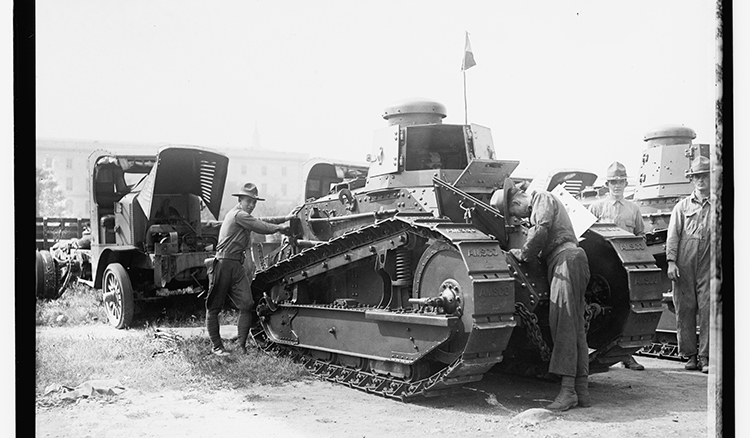 U.S. soldiers work on a World War I era tank in Washington D.C. The tank is similar to many used for the first time during World War I. "The Great War," which the U.S. was involved in from April 1917 to November 1918, is a popular topic with DePaul history faculty Eugene Beiriger and Robert Garfield. (Image courtesy of the Library of Congress)
U.S. soldiers work on a World War I era tank in Washington D.C. The tank is similar to many used for the first time during World War I. "The Great War," which the U.S. was involved in from April 1917 to November 1918, is a popular topic with DePaul history faculty Eugene Beiriger and Robert Garfield. (Image courtesy of the Library of Congress)
One hundred years ago today - Dec. 7, 1917 - the United States declared war on the German ally, Austria-Hungary. Eight months earlier, the U.S. had declared war on Germany thereby entering the Great War, known more commonly as World War I.
Many historians view WWI as a turning point for the rest of the 20th century. Read on as DePaul historians Eugene Beiriger and Robert Garfield discuss the relevance of the war today, how WWI technologies changed how war was waged and how they teach the war in the classroom.
Eugene Beiriger, associate professor of history; peace, justice and conflict studies, College of Liberal Arts and Social Sciences
How is WWI still relevant today?
We cannot understand the issues of today - European politics and union, Russian assertiveness under Putin, Turkish political strife and the politics and divisions of the Middle East, South and East Asia, as well as the growth of U.S. economic and military power - without confronting the important legacies of the First World War.
At the time, it was "the war to make the world safe for democracy," "the war to end all wars," and "the Great War." All these phrases were used to describe the First World War until Europe experienced the rise of dictatorships of the right and the left in the 1920s and 1930s, and a second world war occurred which was greater in magnitude and destruction.
In the U.S. today, the Second World War and the Cold War have long been seen as the most important in the trilogy of 20th century conflicts. Most historians, however, have focused on the First World War as perhaps the most significant event of the 20th century. To them, the First World War remains one of the most bloody, transitional and significant conflicts in human history. The war was the ultimate 'cataclysm,' the 'apocalypse,' and 'Armageddon' itself. It ushered in the 'age of extremes' and the 'century of violence.' All of us continue to experience, directly or indirectly, the legacies of the First World War; its relevance is around us, every day.
What's one thing about WWI that you want to make sure your students know or consider?
I would love them to remember it all, of course. However, I suppose I would like them to think beyond our own national narrative and experience, though that, too, is important. I would like my students to think about a lot of things: About how leaders made decisions for war based on expectations of quick and "guaranteed" victories; how states - and average people - coped with the realities of drawn-out and bloody attritional warfare; how societies were completely mobilized for the war effort; how promises of lasting peace and aspirations for democracy and national independence went unrealized. I think I would like my students to think about how the war is one of the "best" examples of the "law of unintended consequences" and, thus, a cautionary warning to leaders, states and us all to weigh decisions of war and peace carefully and with humility.
Robert Garfield, associate professor of history, College of Liberal Arts and Social Sciences
How did WWI have an impact on technology in war going forward?
WWI was the first war fought in three dimensions, with airplanes above and submarines below. Airplanes ended the idea that a nation was some sort of giant fortress with walls around it that an enemy had to breach. Now you could just fly over them. That contributes to the idea that there was no longer such thing as the battlefront and the warfront. Now everybody was at war and at risk. Military technology changed the sociology of war as well as its actual fighting.
WWI was also the first real mechanical war. Even before the war began, there was the automobile and the airplane. The war also saw the beginnings of the tank and self-propelled artillery pieces. In a sense, warfare was taken over by the internal combustion engine, which meant horses and men simply were not as important as they were before, although they still died in enormous numbers. The ability to build and use things, rather than simply have mass armies, is something that WWI changes very much.
What's one thing about WWI that you want to make sure your students know or consider?
The thing I want students to get from our discussion of WWI is that everything else in the 20th century flows from that conflict, and what made it so historically devastating was not the war per se, but its duration, four and a half years of pure hell. If they get that, then their historical understanding follows naturally.